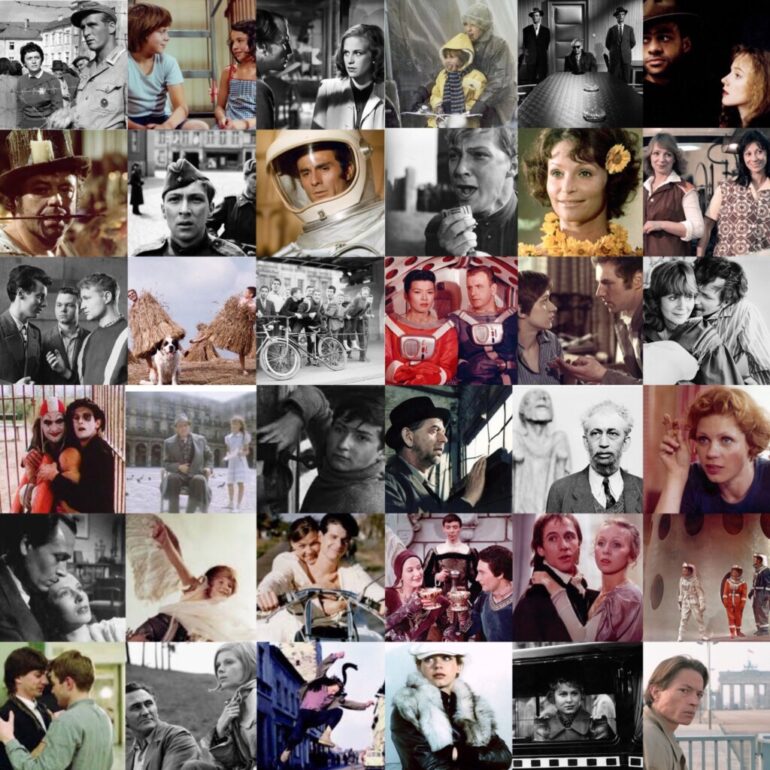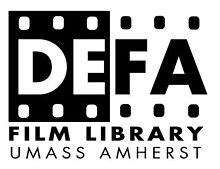DEFA@75 – Join Us in Celebrating!
 On May 16, 1946 the Soviet Military Admin. approved the founding of a film studio in the Soviet Occupation Zone. The next day, over 300 guests from all Occupation Zones celebrated the founding of the new DEFA Studio on the former Ufa grounds in Potsdam-Babelsberg…
On May 16, 1946 the Soviet Military Admin. approved the founding of a film studio in the Soviet Occupation Zone. The next day, over 300 guests from all Occupation Zones celebrated the founding of the new DEFA Studio on the former Ufa grounds in Potsdam-Babelsberg…
(Read the rest below!)
To celebrate the 75th anniversary of the founding of the DEFA Studio, in 2021 we are initiating a wide range of programs and new resources, including:
- A GSA panel on DEFA@75: Critical Questions Today;
- Our new Founder’s Fund Graduate-Student Essay Competition and award;
- Authority & Alterity in East German Movies is the theme that links 3 programs in 2021: a Film+Talk event on The Right-Wing East? (Mar 22-25); our Summer Film Institute, June 13-20; and the accompanying Authority & Alterity Film Festival, June 13-27;
- Our new Teaching Guide series;
- And our new FILMBOX Digital Teaching Archive!The year will also feature DVD releases, including a Helke Misselwitz boxed set; a DEFA marketing campaign on Kanopy; and a social media series featuring The People of DEFA!
Now, back to what happened 75 years ago:
On May 16, 1946 the Soviet Military Administration (SMAD) officially approved the founding of a film studio in the Soviet Occupation Zone. The next day the Filmaktiv group that had been working on the project received the license, and over 300 guests from all four Occupation Zones celebrated at the former UFA grounds in Potsdam-Babelsberg, southwest of Berlin. Gathering to celebrate the first German film studio to open its doors after WWII were the American film officer, Peter van Eyck; German stage and movie actress Carola Höhn; Austrian actress Hilde Körber; the internationally known Russian choreographer and ballet dancer Tatjana Gsovsky; Berlin State Opera director Ernst Legal; and film producer Herbert Uhlich. Colonel Sergei Tulpanov, SMAD’s Cultural commissioner, set the mandate for the studio’s work: “Film, as mass entertainment, must become a sharper and stronger weapon in the struggle against reactionary forces, war and militarism, and for profound democratic influence and the freedom and friendship of all the people of the world.”
Director Wolfgang Staudte had actively championed the revival of the German film industry starting immediately after war’s end on May 8, 1945 and had supported the founding of a Filmaktiv group in October 1945, which helped set up the DEFA Studio. By the May 1946 celebration, ten feature films were thus already under contract. Milo Harbich (A Free Country, Freies Land) and Gerhard Lamprecht (Somewhere in Berlin, Irgendwo in Berlin) were filming on location; and on May 4, Staudte had started work with Hildegard Knef and Ernst Wilhelm Borchert on his milestone film The Murderers Are among Us (Die Mörder sind unter uns). It was the first German film to be released after the war, premiering in the Soviet sector of Berlin on October 15, 1946, and became a classic of both German and international film history.
In the following nearly five decades, until they were privatized in the early 1990s, the DEFA Studios produced thousands of significant works, treating different themes in a variety of genres. DEFA films were screened and won prizes at prestigious international film festivals. Although these productions emerged from a studio system organized according to collective structures, they were not immune to political trends and censorship; research into these pressures has revealed unexpected nuances in what could ruffle official feathers and the ways in which filmmakers could respond.
The DEFA Foundation in Berlin, founded in 1999, now handles the rights for over 700 feature films, almost 500 fictional short films, 950 animation films, 2000 documentaries, 2500 newsreels and serials… and almost 7,000 German-dubbed versions of foreign films distributed in East Germany. The DEFA Film Library at UMass Amherst has helped make these films known outside of Germany and to a younger generation of movie buffs, as well as placed them at the center of contemporary academic concerns.
Source: Courtesy of the DEFA Film Library







